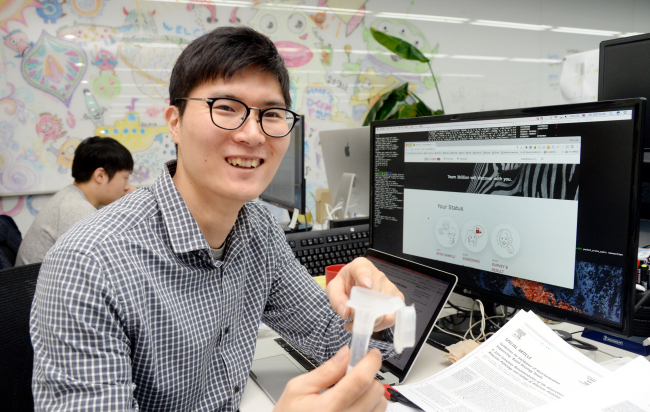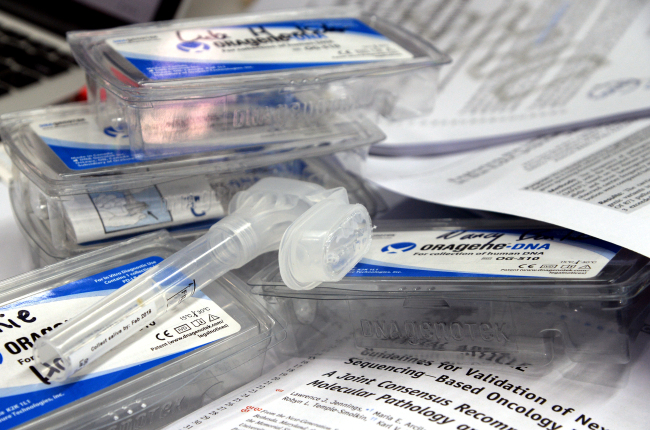Bio
3billion aims to offer affordable DNA screening service for rare disease patients
[THE INVESTOR] At age 4, an American toddler named Nicholas Volker was dying.
Since he was born, the boy had suffered from an unknown disease that caused holes to continually form in his abdomen. Yet, no treatment, whether it be chemotherapy, antibiotics or new forms of medicine, seemed to be effective.
In 2010, doctors at the Medical College of Wisconsin decided to try something that was only beginning to take shape in the medical world -- DNA sequencing. Through it, they discovered a genetic mutation of the XIAP gene in the boy, a finding that led him to receive a lifesaving bone marrow transplant.
Volker’s case marked the first-ever concrete example of how genome analysis could be used to find a potential cure for patients with rare undiagnosed diseases.
 |
Keum Chang-won, CEO of 3billion (Park Hyun-koo/The Korea Herald) |
A Seoul-based startup, 3billion, has set out to solve more cases like Volker’s by providing full DNA sequencing services at affordable prices.
“Since more than 80 percent of rare diseases have genetic origins, one’s genome holds answers to many questions regarding a patient’s condition,” Keum Chang-won, CEO of 3billion told The Korea Herald.
“Volker’s case showed that DNA sequencing can be instrumental in treating rare, undiagnosed diseases. Once doctors can pinpoint the genetic problem, they could start to develop a workable treatment plan,” said Keum who translated a book on Volker‘s case titled “One in a Billion.”
Spun off in November 2016 from Korea’s biggest genetic sequencing firm Macrogen, 3billion uses saliva to analyze a person’s entire exome -- the portion of the genome that expresses genes -- to screen for more than 4,000 rare diseases at once.
Despite the benefits, the biggest block to popularizing exome sequencing has been the immense costs, Keum noted, as testing for just one type of gene costs between $1,000 and $4,000 at hospitals with insurance, and around $5,000 to $20,000 without insurance.
In the case of Volker, his whole exome sequencing procedure reportedly cost around $75,000 at the time.
Overturning this model, 3billion is looking to provide whole exome sequencing -- which looks at all of the expressed genes in a genome -- to individuals for under $1,000,” said Keum, a software engineer and entrepreneur with a Ph.D. in bioinformatics.
According to the CEO, 3billion has managed to significantly cut down the price of its services given technological advances that have lowered the costs of DNA sequencing, as well as its direct ties to Macrogen which offers its services to 3billion at below-market prices.
 |
3billion' saliva testing kit (Park Hyun-koo/The Korea Herald) |
Armed with affordability, 3billion believes patients suffering from rare diseases and disorders -- an estimated 350 million worldwide -- will readily make use of and benefit from its exome sequencing service.
Now 3billion is conducting a beta test of its service for around 150 patients with rare diseases via multiple online heath support communities in the US, such as Inspire.
The health care startup is aiming to officially launch its service by the year’s end, Keum said. It plans to first launch its service in the US following negotiations with the US Food and Drug Administration, with plans to expand into additional markets around the world in the future.
In addition to offering affordable DNA screening services for rare disease patients, 3billion has a bigger goal in the long term -- to compile the data it has gathered to build a global “genome platform.”
“The personal genomic data gathered through our exome sequencing services can become valuable data for medical research as well as more efficient new drug development for rare diseases,” Keum said.
For instance, the foremost step in developing a drug for a particular illness is singling out the problematic protein that must be targeted -- a difficult and costly endeavor that can be aided by DNA sequencing.
In addition, DNA screening can be used as a companion diagnostic test -- a process that determines a drug’s applicability to a specific patient with a certain set of genes. This can help firms develop a new treatment targeting a particular patient demographic with added efficiency, Keum noted.
However, 3billion is not alone in moves in this direction. Big pharma companies around the world already view genomics as an important component of future medicine, including AstraZeneca, which began an ambitious project last year to collect the genome sequences and health records from 2 million people by 2026.
“In the future, we expect more and more big companies will rush into the personal genome data market,” Keum said. “With our exclusive service, 3billion hopes to become a forerunner in this direction.”
By Sohn Ji-young/The Korea Herald (jys@heraldcorp.com)








